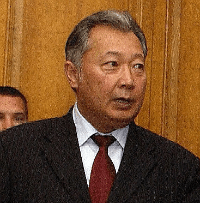BISHKEK, Kyrgyzstan -- With opposition rallies across Kyrgyzstan planned for today, the government of President Kurmanbek Bakiyev has taken calculated measures to avoid a repetition of the Tulip Revolution that swept his predecessor, Askar Akayev, from power almost four years ago to the day, on March 25, 2005. Disillusionment with the current administration is widespread among political observers and the public at large, and is arguably as strong now as opposition to Akayev was four years ago. But experts predict that the demonstrations will achieve relatively little, even as many worry they may be the last chance for the opposition to make itself heard. Since the beginning of 2009, tensions between the ruling Ak-Jol party and opposition parties have risen due to alleged government abuses of power. Opposition members complain of persecution, with a number of them currently facing prosecution on what they claim are spurious charges. The allegations against them range from complicity to murder and abuse of power when in office, to insulting the honour and dignity of the Kyrgyz president. The opposition has also decried government attempts to introduce repressive legislation, including an amendment to prevent the political activity of NGOs. Moreover, the death of key power broker Medet Sadyrkulov -- a former presidential aide turned opposition leader -- in controversial circumstances has led to widespread accusations of a government-ordered assassination.
Kyrgyzstan’s Democracy on Shaky Ground

